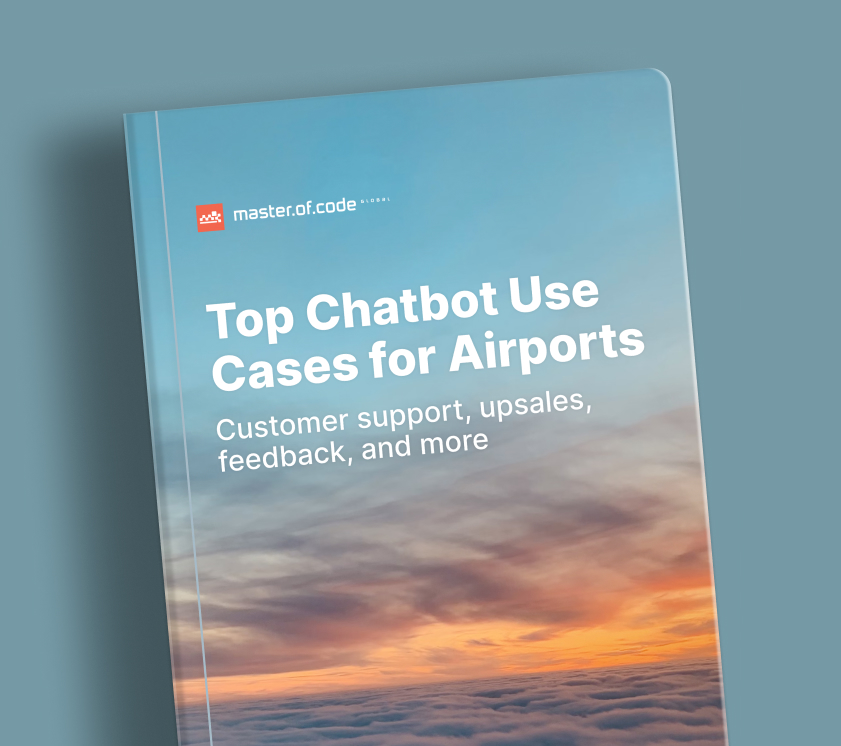A few years ago, only 9% of airports were utilizing chatbots to communicate with customers. Adoption since then has continued to increase, with a projected spend of $3.69 billion USD projected by 2027 for the airports and aviation industries in AI-related services.
With this rise of Conversational AI chatbots, airports are no longer forced to choose between high-quality customer service or low costs – they can have both. In this article, we’ll take a closer look at the top 6 examples of Conversational AI chatbots for airports in 2026, and the key use cases that each solution covers.
Table of Contents
Airport Chatbot Example #1: AI-Powered Parts Bot for Aviation
Master of Code Global developed an AI-powered chatbot that is transforming the way airlines handle aircraft maintenance and parts sourcing. Initially designed to streamline the sourcing of critical aircraft components, this AI assistant allows airlines to automatically check part availability, track orders, and manage customer inquiries—all without the need for manual calls.
Much like how airport chatbots assist passengers, this solution integrates web, voice, and SMS channels, enabling seamless transitions between communication platforms. The AI bot improves operational efficiency by reducing call volumes, speeding up response times, and ensuring a more scalable support system for airlines, which is crucial for high-volume maintenance operations.
By automating routine tasks and enhancing customer service, this solution mirrors the success of airport chatbots in optimizing both workflow and customer experience, showing the broader applications of Conversational AI in the aviation industry.
Airport Chatbot Example #2: Melbourne Airport
Melbourne Airport is the second-largest airport in Australia, with four terminals serving more than 2.2 million passengers in April 2022 alone. Melbourne Airport is famous for its innovative approach to customer services such as hybrid desks and the installation of self-service check-in kiosks, digital signage, and AI chatbot implementation for their call center. Melbourne Airport provides a really good airport AI chatbot example as it covers most customers’ use cases and provides digital assistance to users on both their website and Facebook Messenger.
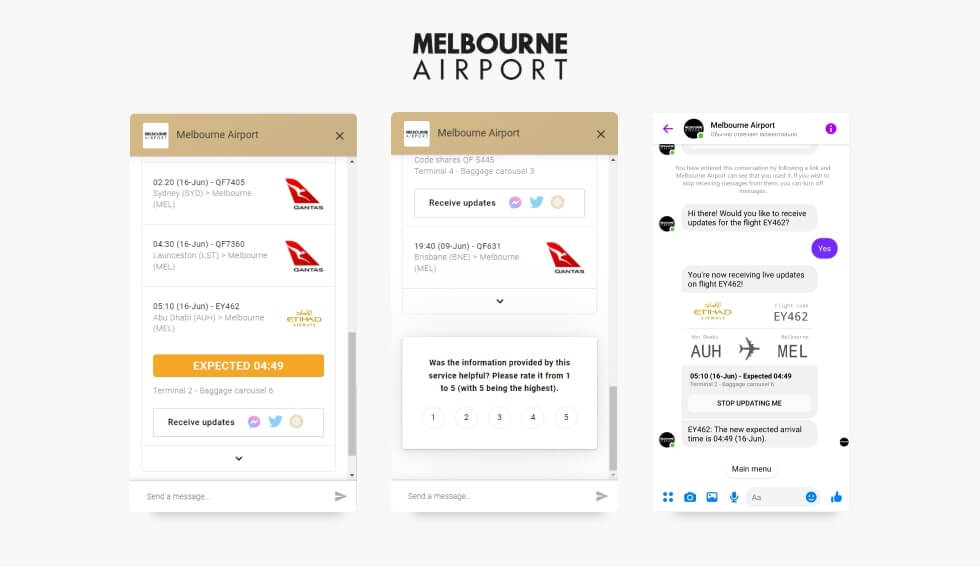
Use Cases covered by AI chatbot from Melbourne Airport
- Real-time flight updates can be tracked by the airport chatbot: with information about the flight number, destination, and airline, current flight status can be checked, and with an API chatbot integration all updates can be sent to the client’s messenger service.
- FAQ page automation with airport latest updates and parking information: which reduces support ticket maintenance. All common questions are collected under the FAQ section within the chatbot, so no need to request them from a live agent.
- Food & beverage and shops search within each of the four airport terminals: the AI-powered chatbot provides a full range of information that contains a venue overview, working hours, and link to the official website.
Airport Chatbot Example #3: Aéroports de Lyon
Aéroports de Lyon, which is part of the VINCI group (a leading private airport operator), is an international airport based in Lyon, France that has served more than 11,7 million passengers in 2019 alone. As one of the main regional airports in Lyon, they provide a range of services for passengers such as parking, shopping, restaurants, and hotels, and much of their customer base asked questions about these topics to their AI-powered chatbot.
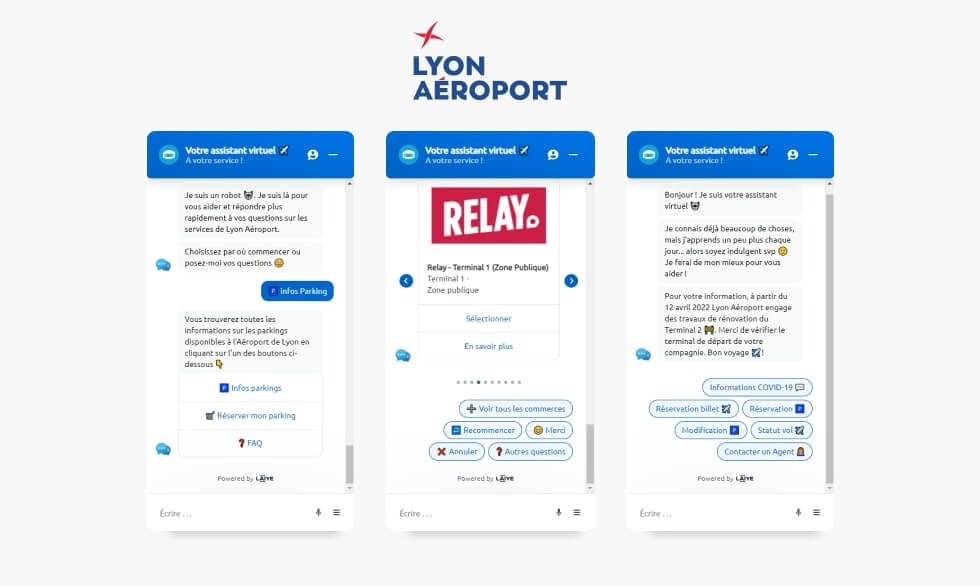
- Flight information automation: With the help of the Lyon airport AI chatbot, passengers can check their flight status, check-in, and ask flight related questions.
- Shop and Restaurant finder: Users can ask the chatbot to look up cafes, restaurants, and boutiques based on which terminal they’re in at the airport. The bot also offers a recommendation engine for sures to find a place to shop or eat suited to their needs.
- Parking information: Lyon airport provides approximately 16,000 parking spaces. By automating access to parking information, users can check the FAQs about the service as well as other activities, including booking parking in advance. After its launch, AI-powered chatbot increased the parking conversion rate by 40%.
- Baggage problem solving: Users can learn about what to do with their bags during connections and how to file a report for lost or stolen bags.
- Navigation option via airport chatbot: In case a passenger wants to spend some free time in the airport, the AI-powered chatbot can navigate the user through shops, cafes, and restaurants, which includes the ability to book a reservation.
- FAQ automation with chatbot: The Lyon airport chatbot provides continually updated information about the current COVID situation per country to its users. Since the requirements differ from country to country, and are continually updated when you consider global travel, the ability to provide the latest travel requirements (such as testing criteria and documentation) on specific locations is necessary.
Airport Chatbot Example #4: Geneva Airport
Geneva Airport is located in Switzerland and in 2023 served 16.4 million passengers. To assist passengers in finding related information and bridge the gap between customers, airlines, facilities, and the airport itself, the Geneva Airport launched their AI chatbot on the Facebook Messenger platform.
With the help of their chatbot, the Geneva Airport automated FAQ page allows users to identify country entrance restrictions due to COVID-19, providing everything a passenger needs to know for how to prepare for the journey, including check-in services, baggage requirements, and the travel documents needed. Their approach on flight information and updates were also included as part of the chatbot, providing proactive notifications for any necessary change to passengers. Check out potential business opportunities with Generative AI for Aviation and Airlines Industry.
Airport Chatbot Example #5: Brussels Airport Assistant “BRUce”
In 2018, launched its chatbot for airlines on Facebook Messenger for testing and collecting feedback about the bot. Now, after a series of tests, improvements, and launches, BRUce – the Brussels Airport Virtual Assistant – is available via WhatsApp, Facebook Messenger, and the airport website. It helps customers check flight information and answer common airport FAQs.
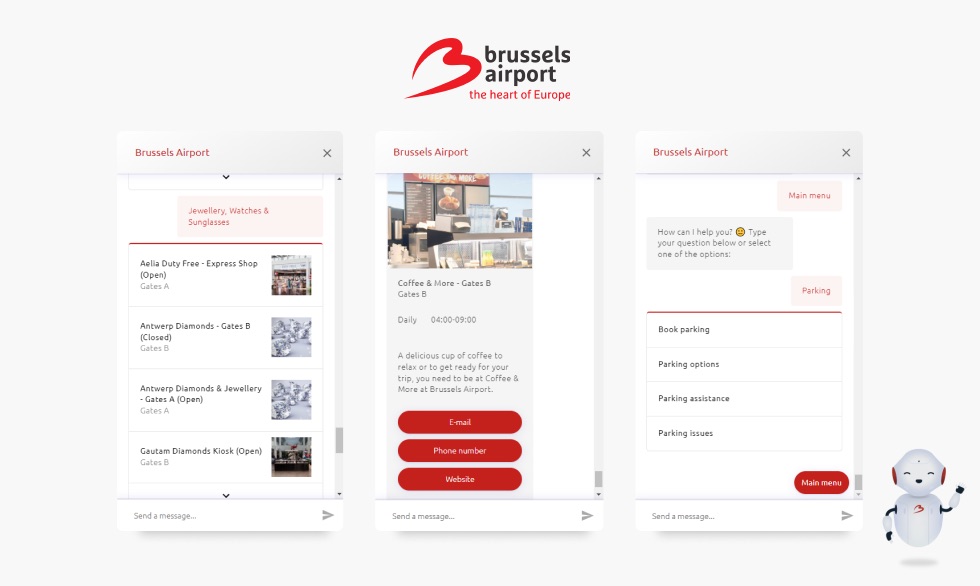
Additionally, shops, parking and train information, COVID-19 restrictions and tests, and all other airport FAQs are automated within the airport chatbot. More recently, services such as ordering a lounge pass and booking parking are also now available through the BRUce AI chatbot.
Airport Chatbot Example #6: Gatwick’s Airport Assistant “Gail”
Gail, Gatwick’s automated chat assistant, was launched in 2019 based on Facebook Messenger. Gatwick Airport, a major international airport in England, wanted to improve customer experience and the quality of conversations with clients. Over just a year, Gail managed to understand and answer about 80% of users’ questions.
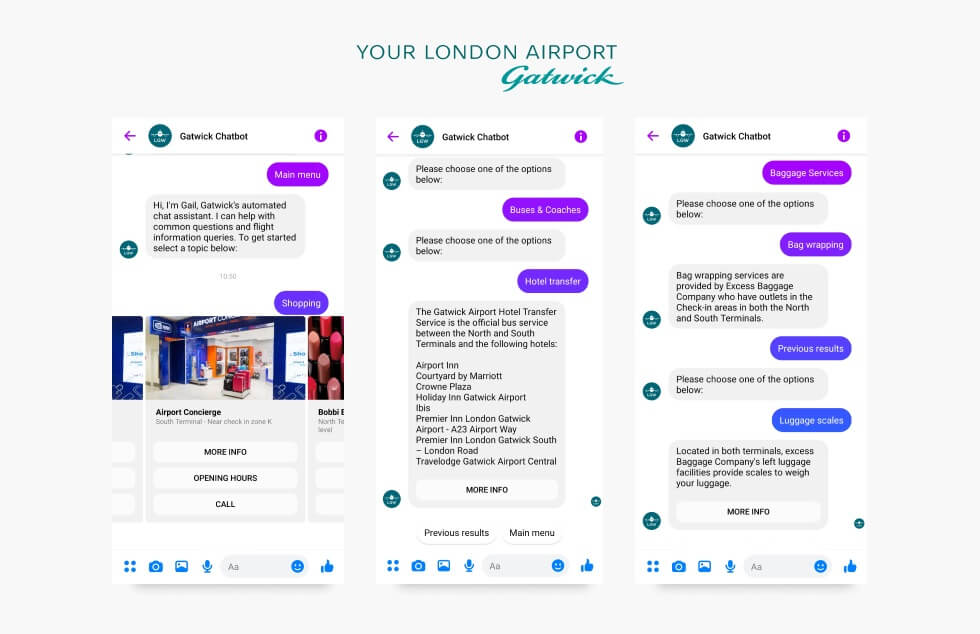
Gatwick’s Airport chatbot takes the role of a guide and helps customers save time by helping them to find all important information before entering the airport itself. Find a flight, check Coronavirus latest info, book a COVID-19 test, and plan your free time in the airport by visiting shops and cafes. This AI-powered chatbot provides easy to access travel information 24/7. Check out top Generative AI Travel and Hotel Chatbot Examples.
We introduced only 5 examples of how airports can implement chatbots and improve customer service by using AI chatbot development services. Airport chatbots cover the most popular use cases and can be developed for the airport’s website as well as other channels for user engagement, such as Facebook Messenger, WhatsApp, and Google Business Messages.
Ready to build your own Conversational AI solution? Let’s chat!




![The Best Airport Chatbots Examples [2026]](https://masterofcode.com/wp-content/uploads/2024/07/Airport-examples-article.jpg)
